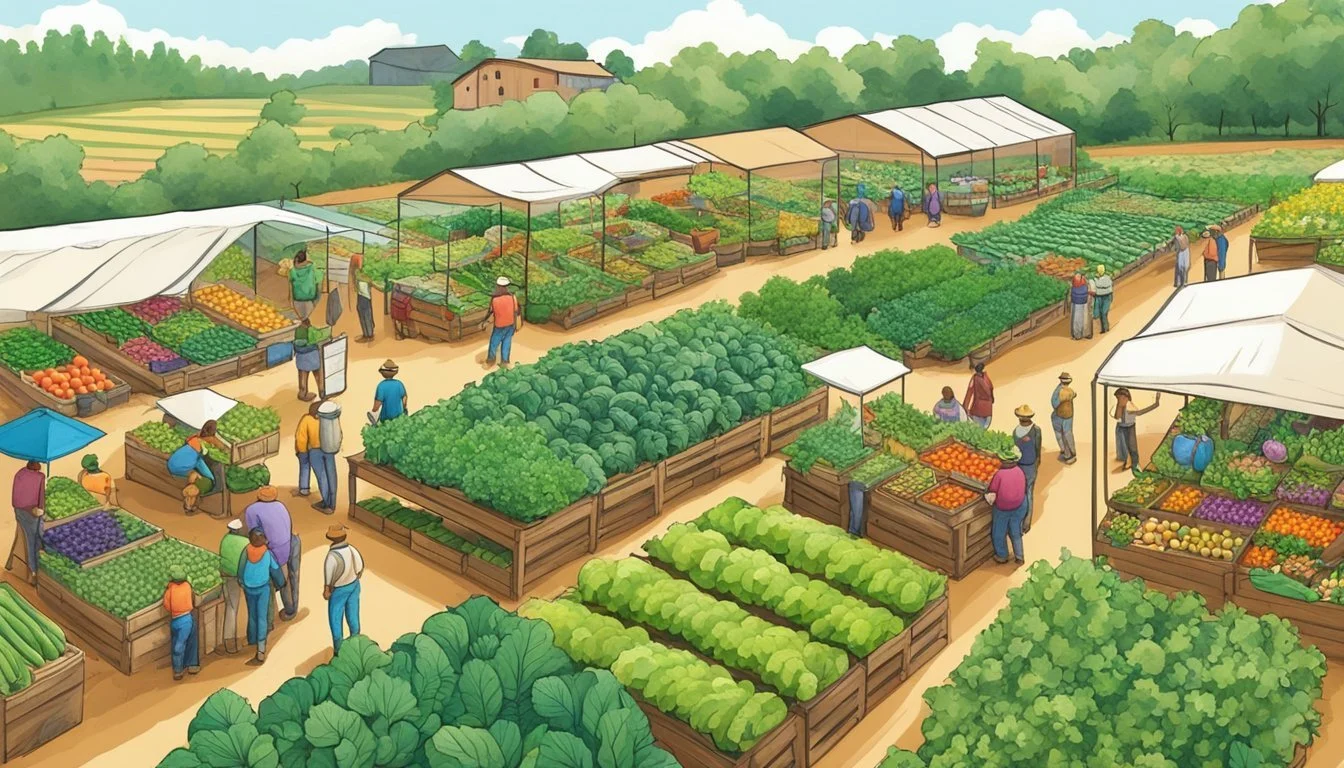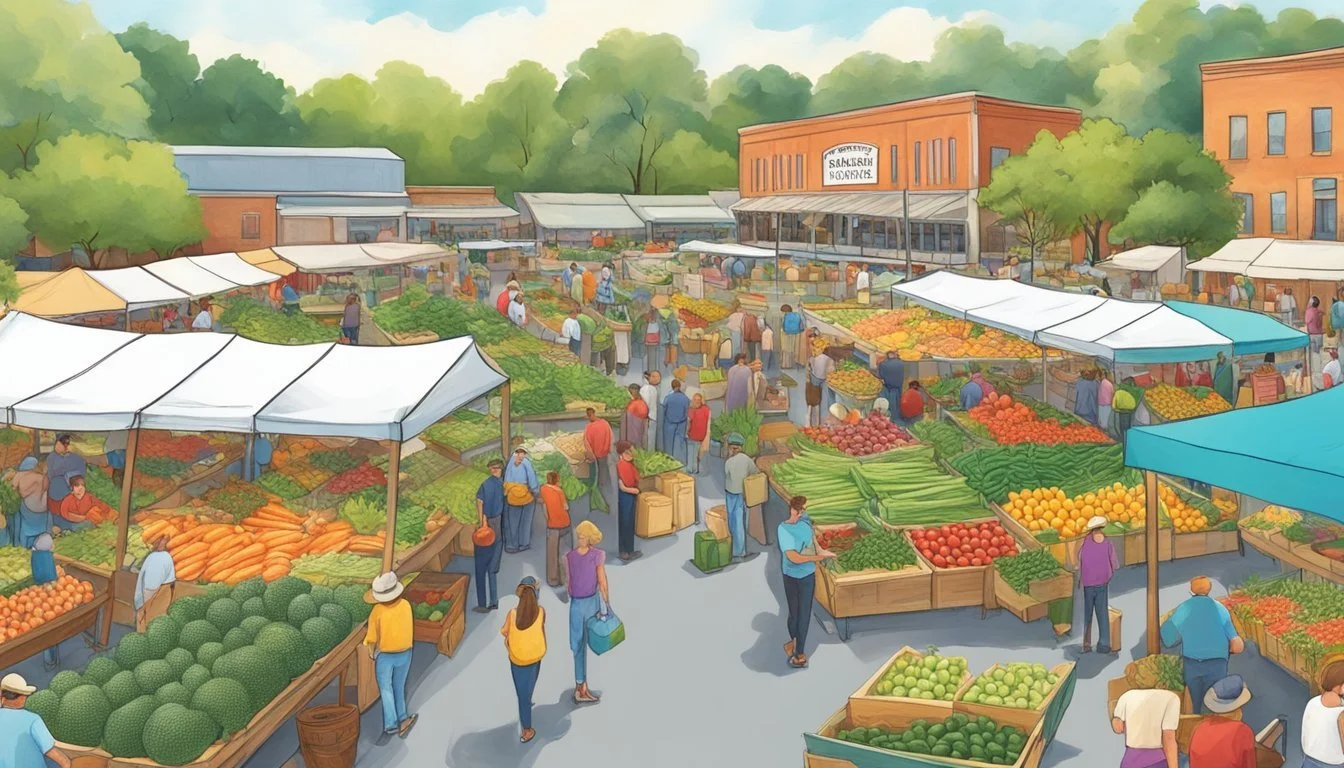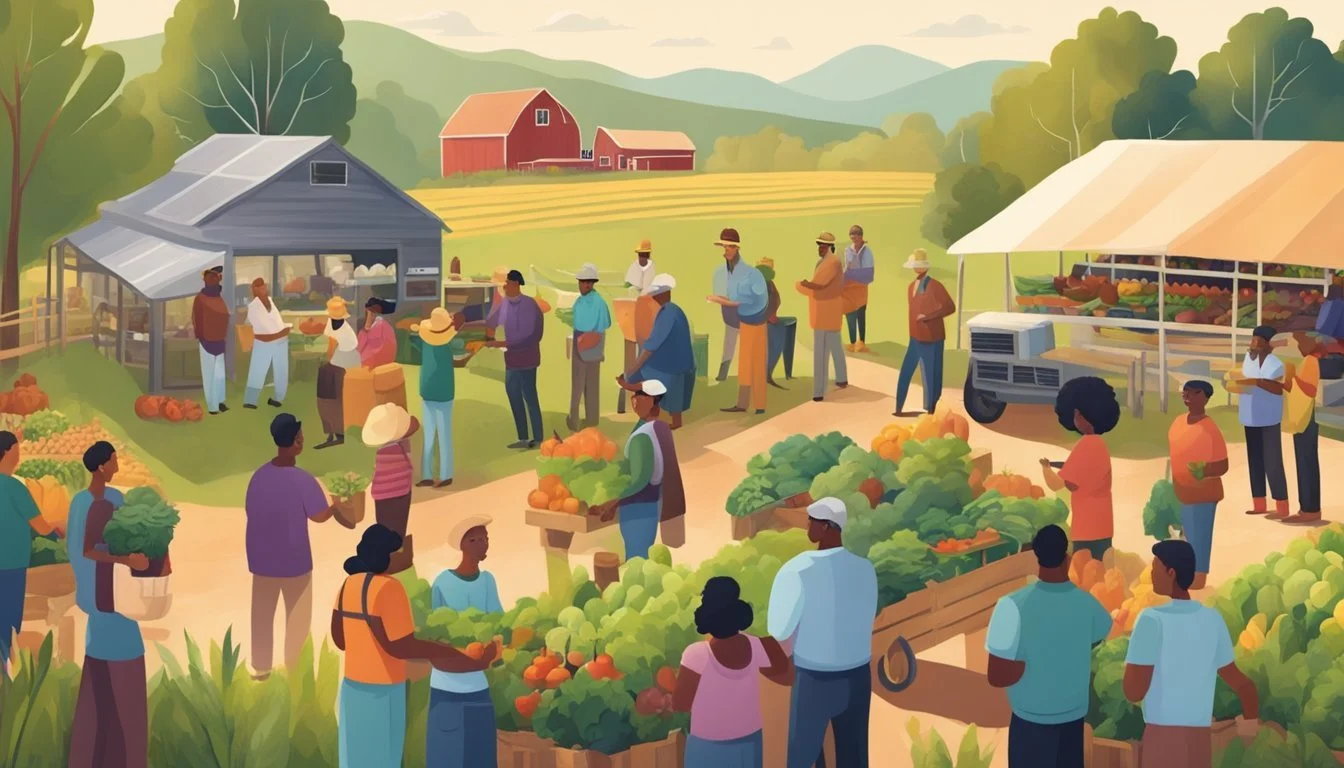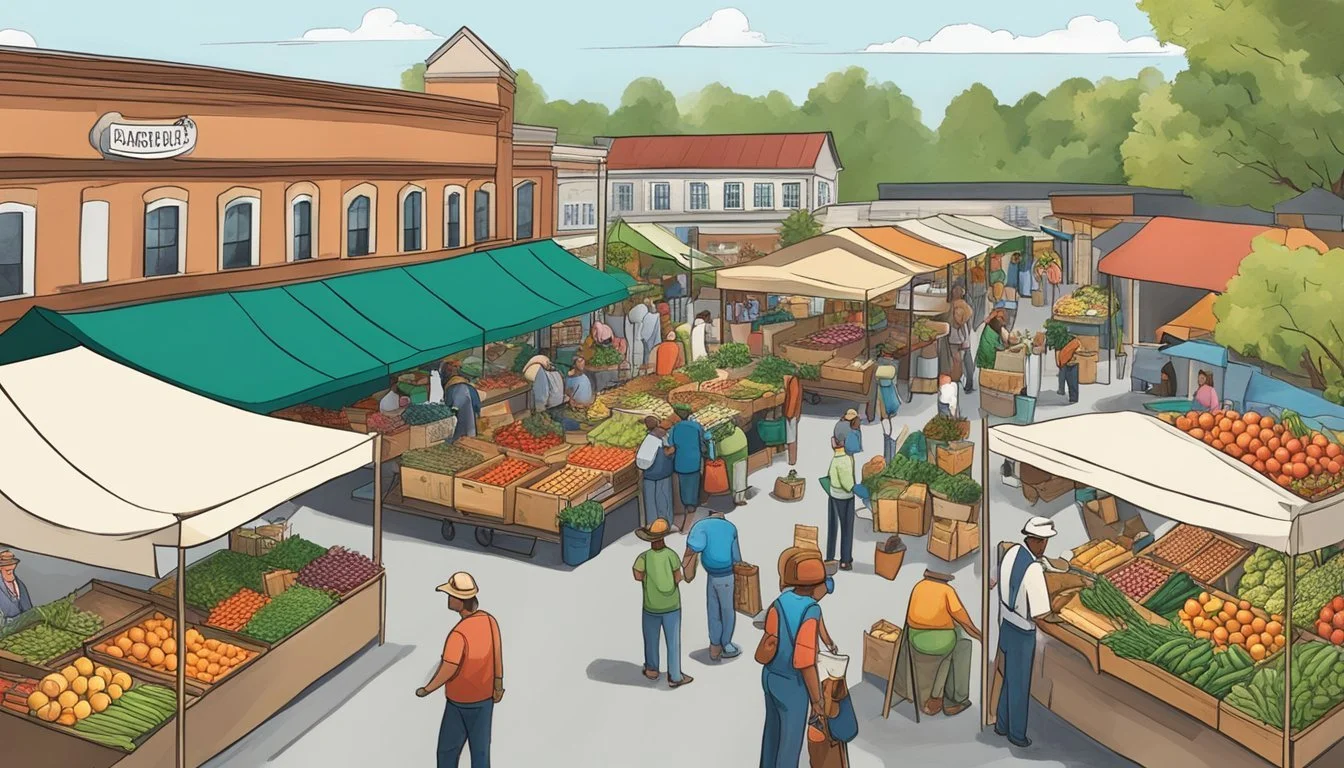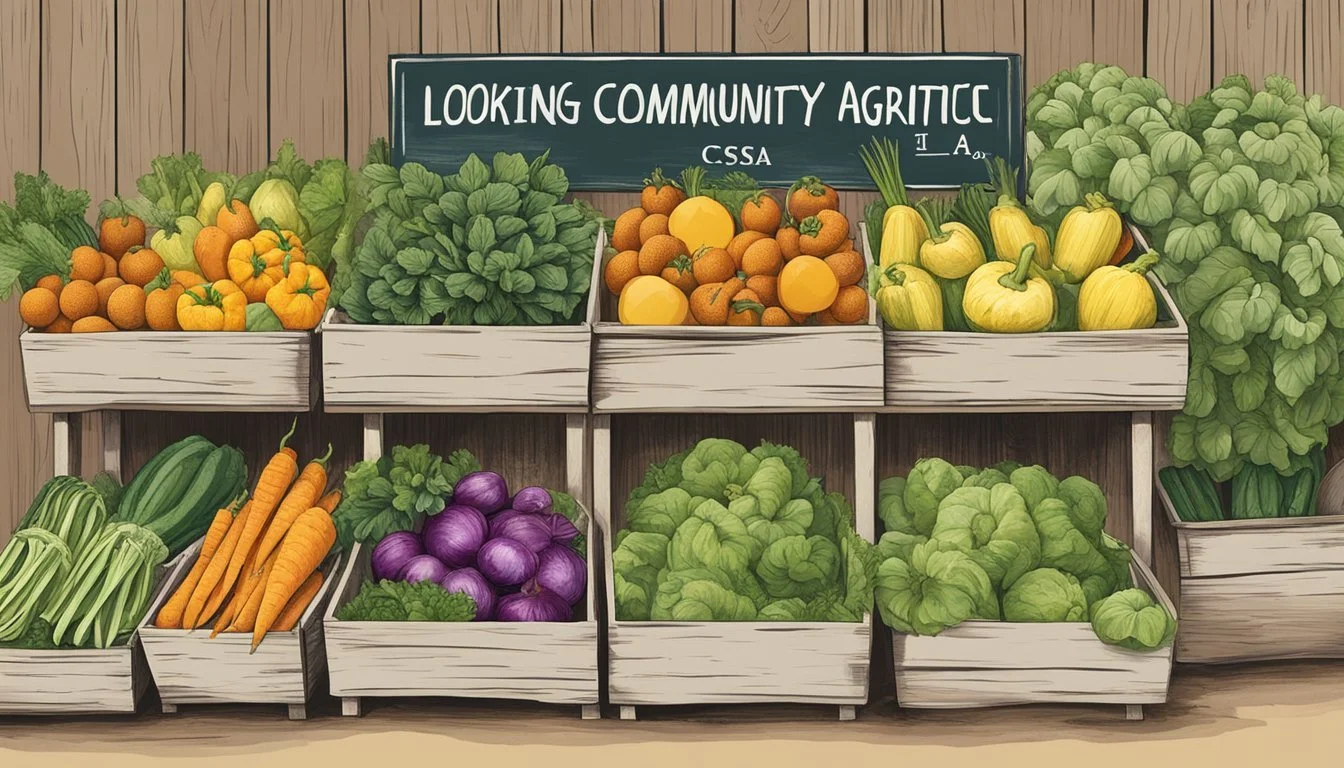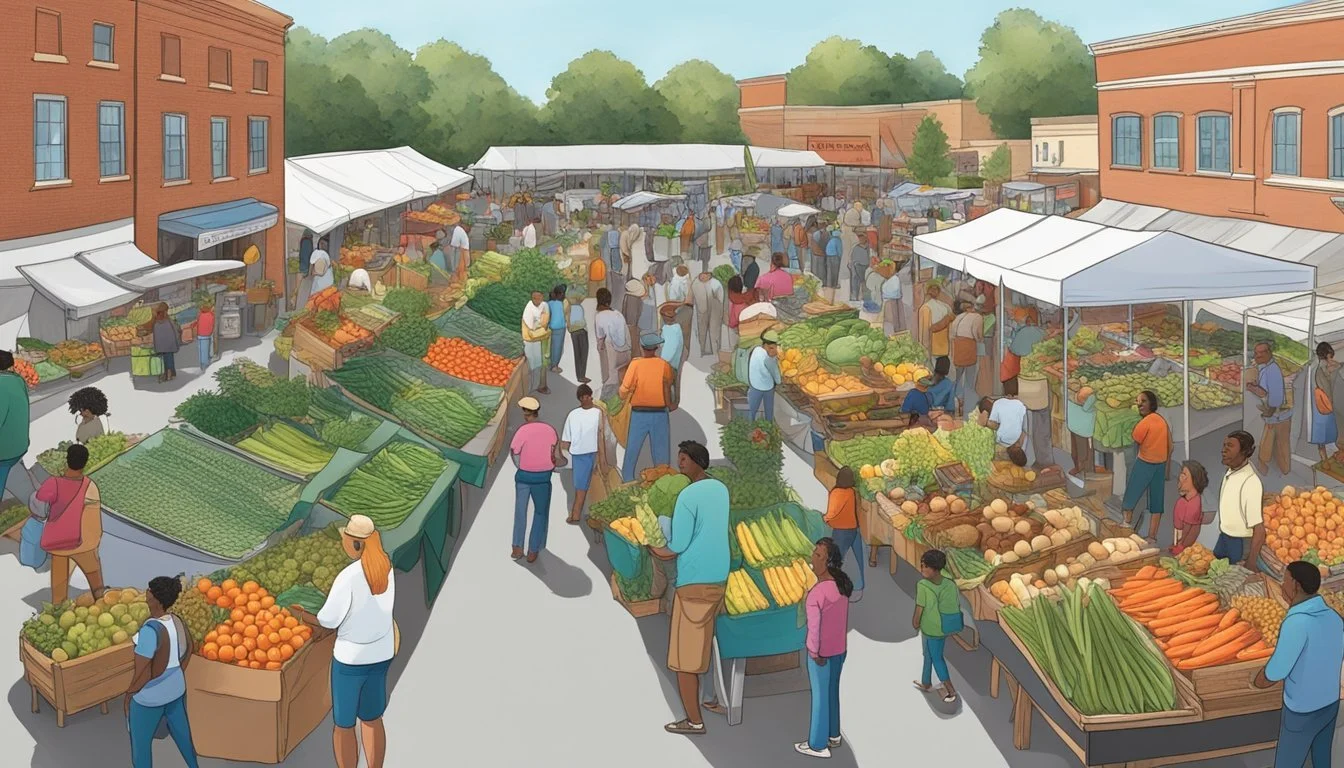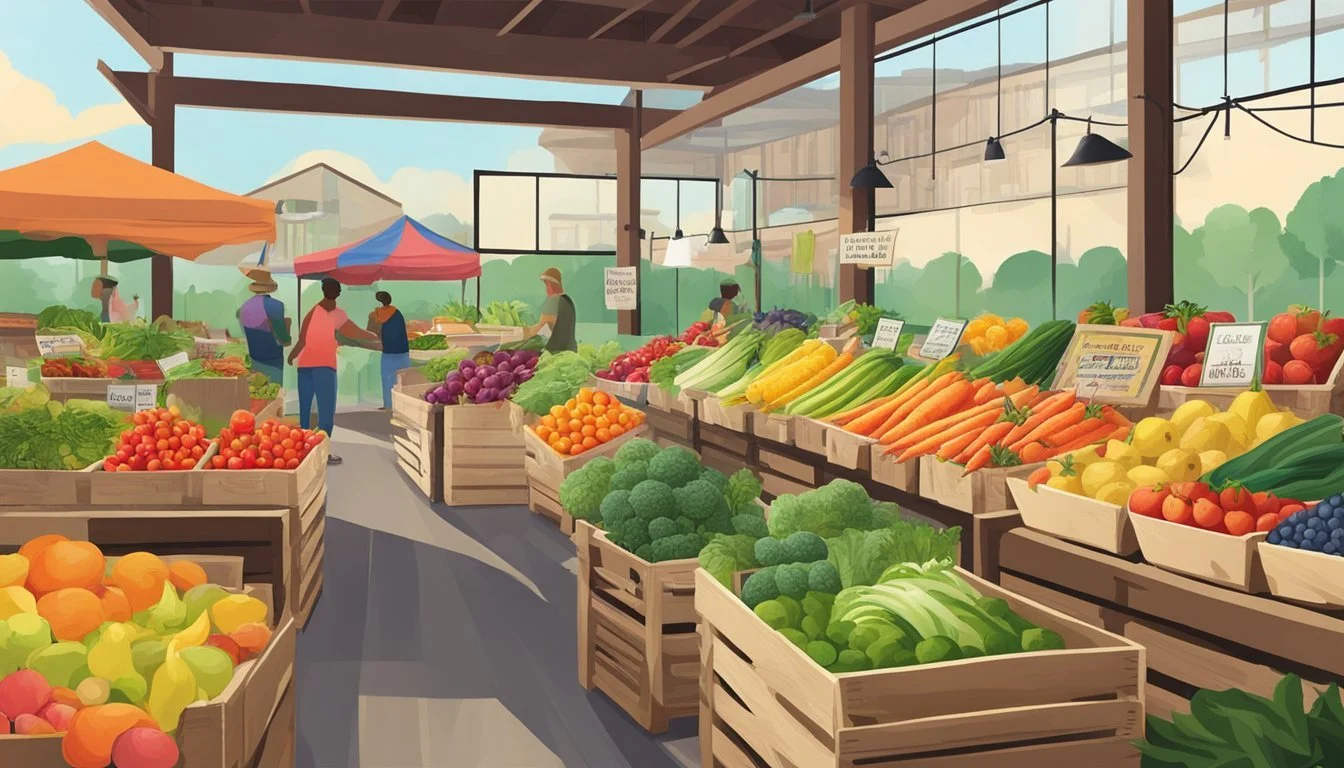Community Supported Agriculture (CSA) in Montgomery, AL
A Guide to Local Produce Subscriptions
Community Supported Agriculture, commonly known as CSA, is an agricultural model that has taken root in Montgomery, Alabama, among other regions. In the CSA framework, community members support local farmers by paying an annual membership fee, which goes towards the farm's production costs. This prepayment model allows farmers in and around Montgomery to receive the necessary funds upfront for the cultivation season. In exchange for their support, CSA members are entitled to a share of the harvest throughout the growing season, often receiving weekly parcels of farm-fresh produce.
This symbiotic relationship not only provides financial stability for farmers but also fosters a stronger connection between consumers and the source of their food. By participating in a CSA program, Montgomery residents are actively contributing to the sustainability of local agriculture. They receive the dual benefit of enjoying high-quality, seasonal produce and the assurance that they are backing environmentally friendly farming practices. This support for local farms is especially crucial in building a resilient food system and promoting food security within the community.
With a variety of CSA options available near Montgomery, community members can choose from different farm offerings. Some CSAs might include farm products beyond vegetables, like eggs or dairy. Furthermore, the programs often extend opportunities for members to interact with those who grow their food, cultivating a thriving sense of community around local agriculture. Through CSA participation, residents of Montgomery are integral in maintaining the vitality of local farms and contributing to the broader movement towards sustainable agriculture.
Fundamentals of Community Supported Agriculture
Community Supported Agriculture, commonly known as CSA, is a model that fosters a mutually beneficial partnership between local farmers and community members. It is grounded in the principles of direct consumer-farmer engagement and shared responsibility.
Understanding CSAs
Community Supported Agriculture (CSA) is a strategy for food distribution that connects the community with local farms. In a CSA model, members purchase shares of a farm's anticipated harvest, essentially investing in the farm's production ahead of the season. This model provides farmers with upfront capital to manage their operations, while members anticipate the delivery of fresh, locally-grown products.
Benefits for Consumers and Farmers
For consumers:
Access to fresh, local produce.
Knowledge of where and how their food is grown.
For farmers:
A direct line of financial support from the community.
Opportunity to plan for the season with a better estimate of demand.
This synergy enhances the economic and ecological sustainability of the farming enterprise while allowing consumers to support their local food system.
CSA Structure and Membership
Members of a CSA typically make a commitment by purchasing a "share" from the farmer before the growing season begins. This share entitles the member to a percentage of the farm's harvest, usually provided in weekly or bi-weekly allotments during the growing season. Membership structures may vary, with some offering tiered options depending on the amount of produce the member wishes to receive. The predictability of this model gives farmers a secure market and members a regular source of fresh food.
CSA in Montgomery, AL
Montgomery's embrace of Community Supported Agriculture (CSA) signifies a commitment to fresh, local produce and a direct farmer-community member relationship. This section explores the CSA landscape in Alabama's capital city.
History of CSAs in Montgomery
CSA as a concept became a part of Montgomery's agricultural scene over 25 years ago, coinciding with a wider movement to connect consumers with local food sources. Initially, the adoption of CSA models was slow, but awareness and participation have grown among residents hungry for local produce.
Local CSA Farms
Wild Yeast Kitchen and Sky Farms are two examples of successful CSAs within the Montgomery area. They provide fresh, high-quality produce through modern methods like hydroponics, connecting the community directly with their food sources. These farms have paved the way for others, including family-run operations like Kith & Kin CSA, which offers organic and heirloom vegetables.
Participation and Support
Local farmers extend CSA membership offers to the community, which in turn supports the farms by paying an annual membership fee. This model allows members to receive a weekly share of the harvest, fostering a mutual commitment between local farmers and Montgomery's residents. Events and partnerships often serve to increase participation and awareness of CSAs within the broader community.
Economic Impact
Community Supported Agriculture has more than just nutritional benefits; it contributes economically to Montgomery. By prioritizing farm-to-table commerce, CSAs keep money within the local economy and provide stability for small farms. Local farming benefits from this direct line of support, ensuring that agriculture remains a vital part of Montgomery's future.
Choosing a CSA
When individuals are selecting a CSA in Montgomery, AL, they must assess various factors such as share options, seasonality, and payment plans to ensure they receive a service that aligns with their needs.
What to Consider
One should consider the location of the farm, frequency of deliveries, and the variety of produce available. Proximity to the farm can affect freshness and convenience, and the diversity of produce each week can impact satisfaction with the shares received.
Types of Share Options
CSAs offer a range of share options to accommodate different household sizes and preferences:
Quarter food shares: Suitable for individuals or small families who prefer a smaller quantity of produce.
Half food shares: Ideal for medium-sized families or those who enjoy a variety of vegetables and fruits.
Seasonal offerings like Summer food shares, that last from late May through July, offer a bounty that aligns with the local growing season.
Payment Plans
Payment plans are pivotal to ensure the CSA is financially viable for all parties. Here's a brief overview:
Annual membership fee: Covers the whole season; prices vary depending on share size.
Installment payments: Some CSAs offer payment in installments, making budgeting easier for members.
Members support local farmers by providing funds upfront, which is critical for the farm's production costs. This mutual commitment allows for a consistent supply of fresh, high-quality produce throughout the season.
From Farm to Table
Community Supported Agriculture (CSA) in Montgomery, AL, connects local farms with consumers, providing them access to seasonal harvests, fresh farm products, and a transparent overview of the agricultural practices used to produce their food.
Seasonal Cycles and Harvests
CSA programs in Montgomery follow the rhythm of the seasons, which dictate the variety of produce available. Farmers plan their crops according to what grows best in Alabama's climate, ensuring a diverse selection of fruits and vegetables. For instance, spring may bring in leafy greens and radishes, while summer could boast tomatoes and sweet corn. Subscribers receive products at their peak freshness, corresponding with the natural harvest times throughout the year.
Distribution Methods
Distribution in CSAs is direct from farm to table. Members typically pick up their shares at designated locations or the farms themselves. Distribution points may include:
Local Markets: Where farmers bring freshly harvested produce on specific days.
Farm Pickup: Members visit the farm to collect their shares, often providing a closer look at the farming process.
Delivery Services: Some CSAs offer the convenience of home delivery, ensuring accessibility for all members of the community.
Organic and Sustainable Practices
Montgomery CSAs are advocates for organic farming and sustainable agriculture practices. Farmers avoid synthetic pesticides and fertilizers, focusing on ecological balance and soil health. Crop rotation, cover cropping, and the integration of livestock are common practices to maintain a healthy farm ecosystem. These methods ensure the long-term fertility of the land and provide consumers with chemically-free produce. These choices reflect a commitment to both environmental stewardship and consumer health, embodying the integrity of the farm-to-table movement.
Impact on Health and Environment
Community Supported Agriculture (CSA) programs in Montgomery, AL, offer substantial health benefits and foster environmental stewardship. They provide fresh produce directly to consumers and encourage sustainable farming practices that promote soil and ecosystem health.
Nutritional Benefits of CSA Produce
Freshness: CSA members access produce at its peak freshness, which can lead to higher nutrient content compared to store-bought counterparts. The short time between harvest and distribution minimizes nutrient loss, ensuring that locals consume food rich in vitamins and minerals.
Diversity: A typical CSA box may contain a wider variety of produce than what consumers might usually purchase, potentially increasing the diversity of nutrients in their diet. This exposure to different fruits and vegetables can encourage healthier eating patterns.
Environmental Stewardship
Soil Health: CSAs in Montgomery, AL, apply farming methods that prioritize soil health, often employing crop rotations and organic practices. This approach can enhance biodiversity, improve soil fertility, and reduce erosion.
Sustainability: By focusing on local produce, CSAs help maintain local ecosystems and reduce carbon emissions associated with long-distance transportation. The reduction of food miles decreases the overall climate impact of food production.
Biodiversity: Supporting local farms often translates to the cultivation of a broader range of plant species. This diversity is vital for maintaining resilient agricultural ecosystems that can withstand pests, diseases, and climate change challenges.
Community Engagement and Outreach
Community Supported Agriculture in Montgomery, AL, strengthens the bond between local farmers and residents through active learning and collaboration. This engagement fosters a well-informed community that appreciates the sources and benefits of local produce.
Educational Workshops and Events
Montgomery's CSAs play a pivotal role in educating the public through workshops and events. They host a variety of educational opportunities that range from sustainable farming practices to cooking demonstrations using fresh, locally sourced ingredients. These events serve as platforms for individuals to learn directly from farmers and cultivate a deeper understanding of agriculture's role in their daily lives.
Farmers Markets and Local Partnerships
Local farmers markets are essential in Montgomery's CSA programs. They serve as weekly meet-ups where the community can procure fresh produce and interact with the people who grow their food. CSAs in Montgomery often form partnerships with local businesses and organizations to extend their reach and impact, ensuring that the public has access to wholesome food and that farmers receive robust community support. These partnerships highlight the symbiotic relationship between local agriculture and the local community.
Key Challenges and Considerations
Engaging in Community Supported Agriculture (CSA) in Montgomery, AL, presents a unique set of challenges and considerations. These revolve around the natural unpredictability of weather, the need for economic sustainability, and the importance of active community participation.
Weather and Seasonal Limitations
Montgomery, AL, experiences a subtropical climate with hot summers and mild winters. However, weather variability poses significant limitations to agricultural production. CSA farmers must plan for and manage these risks:
Drought: Prolonged periods without rain can impede crop growth, necessitating efficient irrigation strategies.
Severe Storms: The region is prone to severe weather, including thunderstorms and the occasional tornado, which can damage crops and infrastructure.
Economic Sustainability
For a CSA to thrive, it must be economically sustainable. This requires balancing initial investment costs with long-term financial planning. Key economic considerations include:
Cost Management: Keeping infrastructure and operational costs in check to ensure share prices are accessible to community members.
Market Fluctuations: Anticipating market changes to avoid financial strain from unsold produce or unmet production costs.
Community Involvement
The success of a CSA is heavily reliant on consistent community involvement. Challenges include:
Member Recruitment: Effectively marketing the CSA to attract a sufficient number of shareholders.
Engagement: Keeping community members engaged and invested in the CSA's success through open communication and opportunities for involvement.
Looking Ahead
The agricultural landscape of Montgomery, AL, is poised for innovative developments in the realm of Community Supported Agriculture (CSA). Local stakeholders are actively working to enhance the vitality of CSAs and their ability to connect with the community.
The Future of CSAs in Montgomery
Montgomery County is witnessing a transformative period for local agriculture, particularly for CSAs. They are projected to play an increasingly pivotal role in the region's food system by bolstering food security and facilitating access to fresh produce. CSA farms emphasize sustainability and resilience, fostering a direct bond between consumers and their food sources. This trend is being driven by individuals and families placing a higher value on knowing where their food comes from, as well as a growing support for local farmers. Future efforts may focus on expanding membership options and creating more engaging experiences for CSA members.
Advancements in CSA Models
In terms of advancements, Montgomery's CSA models are evolving through innovation and technology integration. Upcoming CSA models are anticipated to integrate CSA management software to streamline operations, providing smoother experiences for both providers and consumers. Advancements might include:
Online platforms for membership management, allowing for easier sign-ups and renewals.
Improved distribution logistics, expanding the reach within Montgomery and beyond.
Enhanced community engagement through social events, farm visits, and educational programs about sustainable farming.
This progress signifies that Montgomery County's CSAs are not only adapting to contemporary demands but are setting a precedent for future growth in the local food economy.
Resources and Further Reading
Community Supported Agriculture (CSA) provides invaluable resources for those interested in supporting local agriculture in Alabama. Individuals looking to join a CSA or gain further insight into local food systems can utilize a range of materials and references to become better informed.
Local CSA Programs:
Heron Hollow Farms offers bi-weekly delivery/drop-off to houses around Gurley, AL. For those located within this region, contacting Heron Hollow can give insights into their delivery methods and produce availability.
Montgomery County, Maryland CSAs
Red Wiggler Community Farm boasts a longstanding CSA program since 1996, which could provide a model for CSA practices suitable for Alabama.
The Farm at Our House, while not based in Alabama, uses a certified organic approach and serves as an example of sustainable CSA operation.
Guides and Publications:
A resource guide for farmers specifically targeted toward CSA operation can provide foundational knowledge. This guide covers aspects like consumer memberships, seasonal payments, and cost expectations, which are relevant across the United States.
Government and Educational Resources:
Agricultural extensions and the United States Department of Agriculture (USDA) offer localized information and guidelines that may pertain to Alabama-based CSA. Their resources cover a wide array of topics from marketing to sustainable practices.
Alabama Agriculture Specifics:
For Alabama-specific information, residents may consult local agricultural agencies or extension programs that tailor CSA information to the state’s climate, crop cycles, and consumer base.
The knowledge acquired from these resources will help readers become confident and knowledgeable about CSA systems in the United States and particularly in Alabama, from the operational to the consumer level, ensuring informed decisions in the local agricultural community.
Glossary
CSA (Community Supported Agriculture) A model of farming where community members support a farm operation by paying a membership fee in advance. This financial model allows for better planning and sustainable farming practices.
Shares In the context of CSA, shares refer to the portion of the farm's produce that a member receives, usually on a weekly basis. Shares typically include a variety of fresh produce.
Local Refers to products that are grown or produced within a close distance to where they are sold, emphasizing the importance of supporting local economies and reducing food miles.
Fresh Produce A term used to describe fruits and vegetables that are harvested and distributed without undergoing a long term storage or a preservation process, ensuring maximum freshness.
Sustainable Farm A farm that operates in a manner which maintains the health of the environment and preserves resources. Sustainable farms often employ practices like crop rotation, organic farming, and reduced chemical use.

